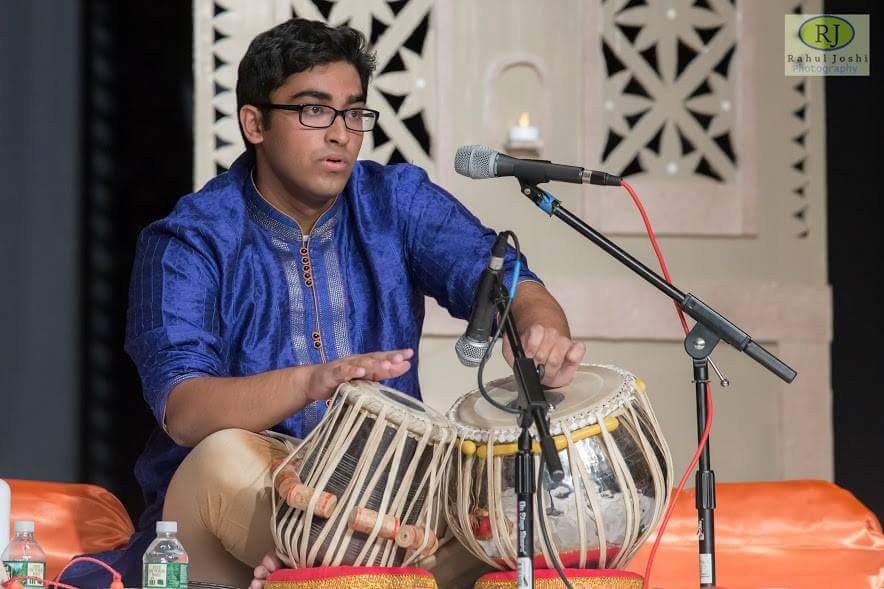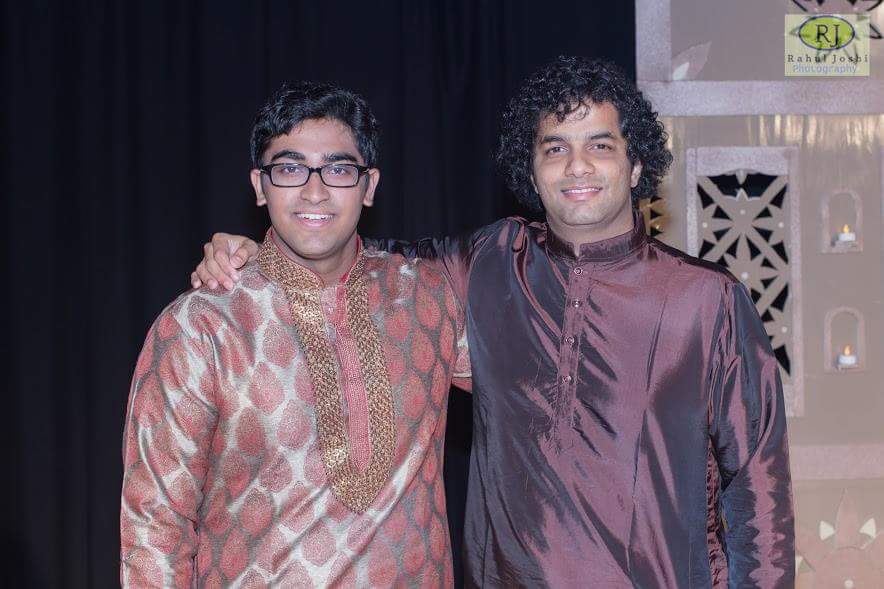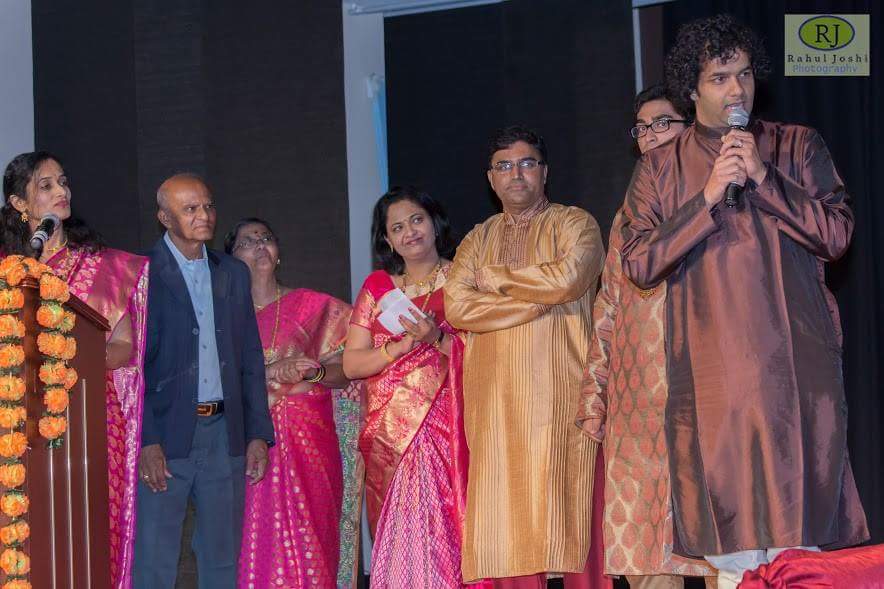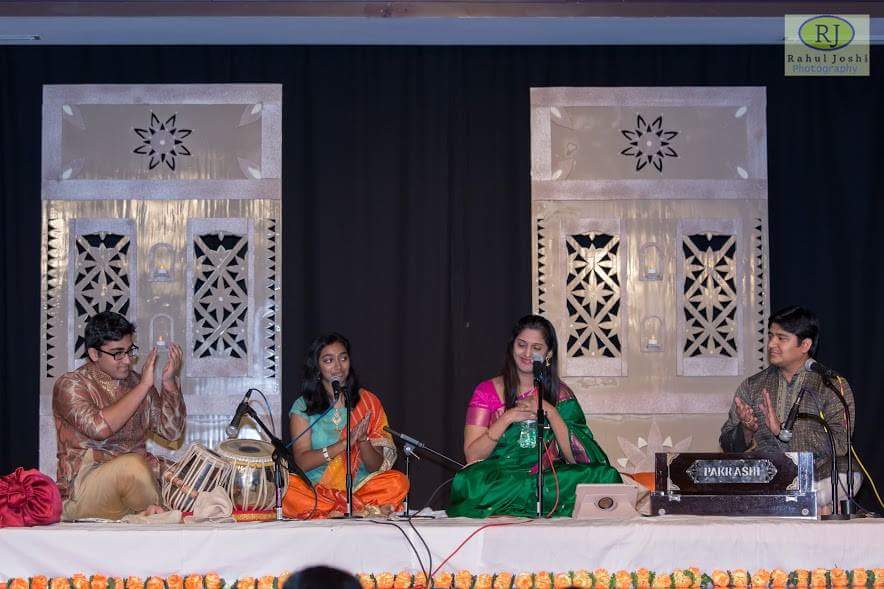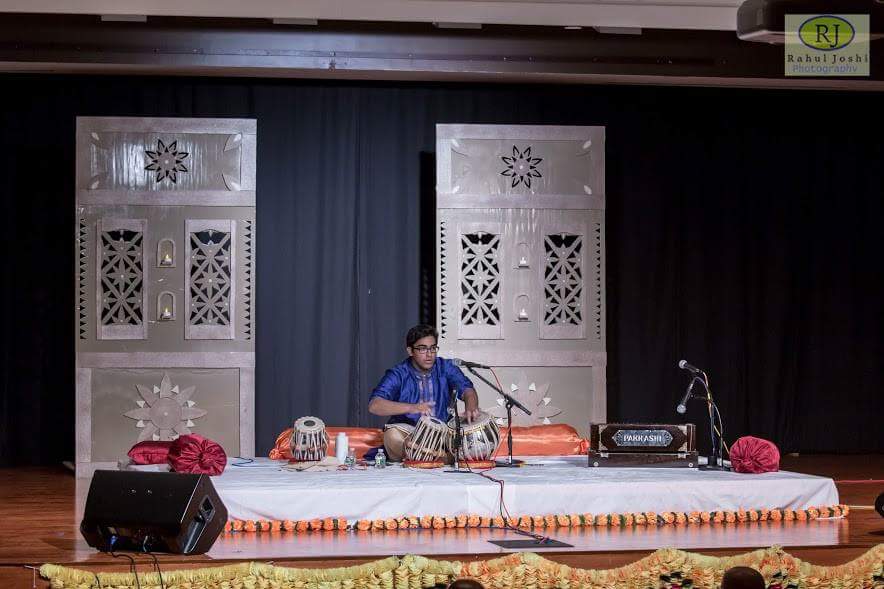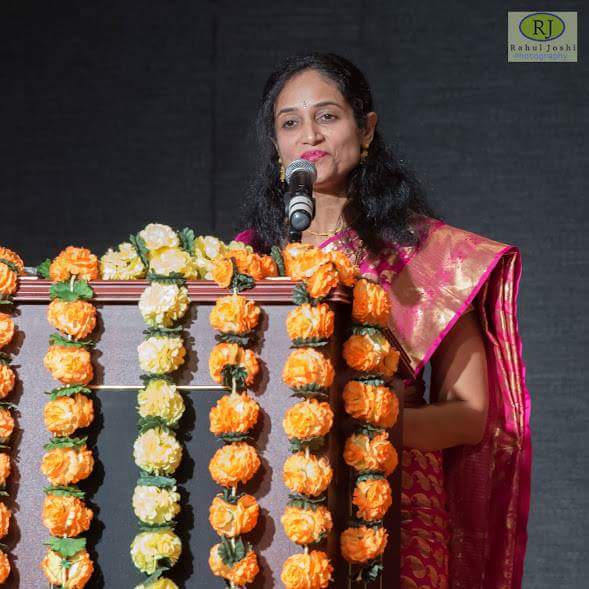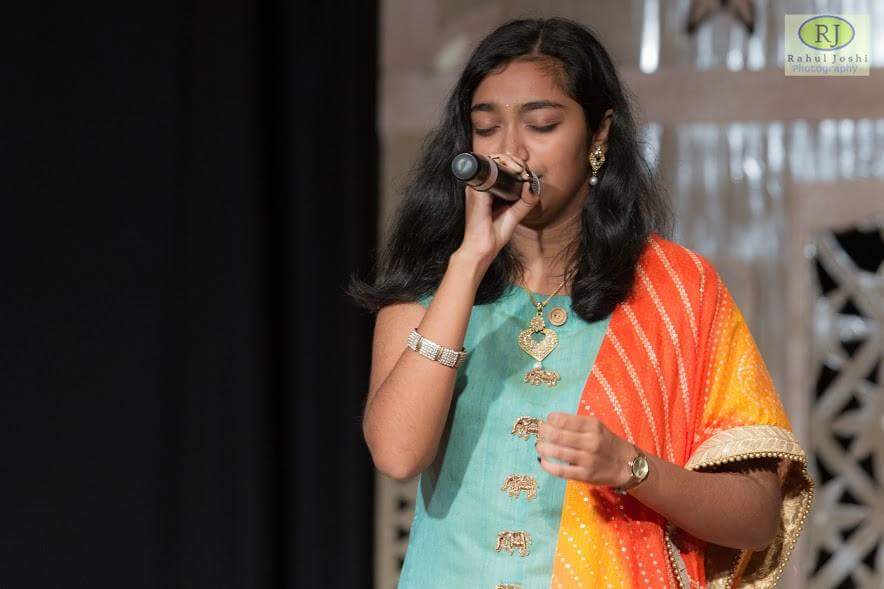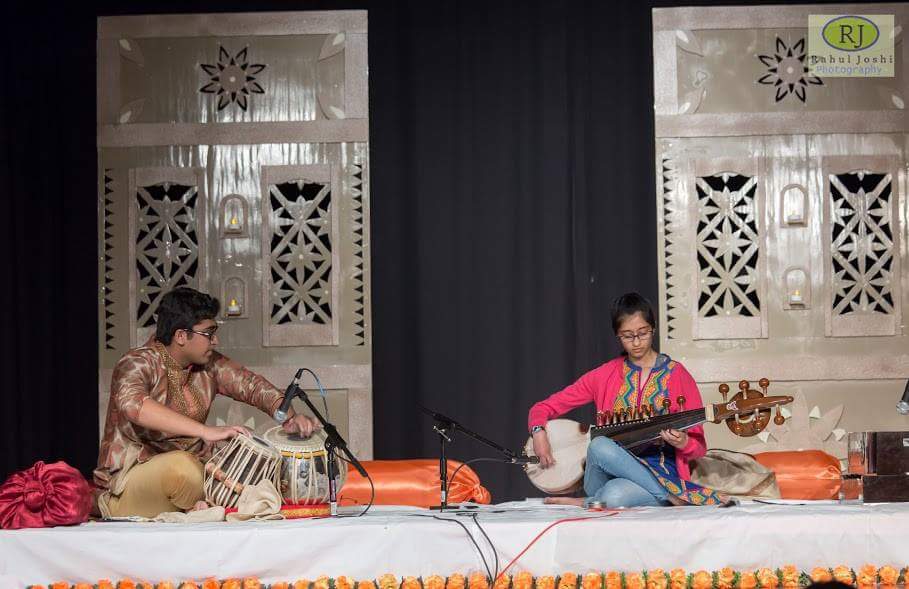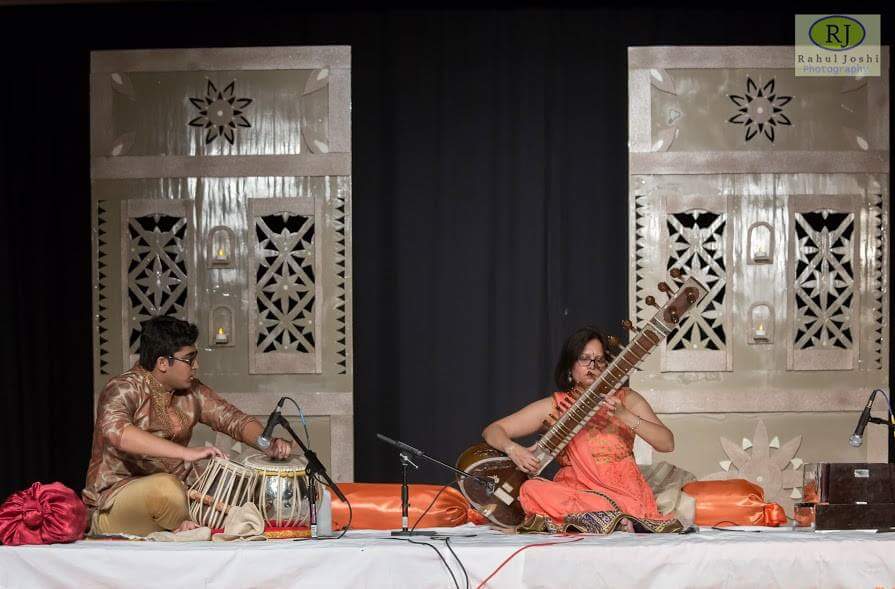Contribute
| Tabla Arangetram Of Atharva Kasar |
Chitra Deshpande
08/30/2017
(This article is sponsored by Masala Art)
On the warm summer afternoon of August 13th, Chinmaya Maruti Temple in Andover was bustling with activity of the Ranga- pravesh of Atharva Kasar, a budding Tabla artist from Acton. Tabla Ranga Pravesh is the stage debut of a student of the Indian percussion instrument of Tabla, typically, after years of learning and practice under the tutelage of a master of the art. Atharva is known for his dedication and focus that came shining through in his debut performance at Chinmaya. Tabla has been used in North Indian classical and popular music in India for centuries.
Tabla is played on two drums using complex technique and fingers and palms of both hands to create distinctive bols and rhythms that can be enjoyed both on its own,, or as accompanied by other instruments such as Sarod and Sitar. Ustad Allarakha Khan, Ustad Zakir Hussain Khan and other famous tabla masters from India have made tabla very popular among musicians and music lovers alike.
The Indian Classical music scene in New England is also bustling with activity as a growing population of young Indian-Americans have a choice to learn the traditional instruments in US. Several eminent and budding artists from New England, as well as fans of Indian classical music, along with friends and family of Atharva flocked to Chinmaya Maruti Temple to attend this stage debut. Atharva’s grandparents flew from India to bless Atharva and their mutual love and appreciation was evident in all their interactions. The entrance and stage were beautifully decorated by the friends and family of Atharva’s parents, Nilima and Suhas Kasar. Atharva who has been learning tabla for the past eleven years from his Gurus Shri. Aditya Kalyanpur and Shri. Amit Kavthekar at the New England School of Music is currently a rising junior at Acton-Boxborough Regional High School. Both of Atharva’s Gurus are well-known in the musical circles in India and US.
Atharva’s parents introduced him to music at a very young age. At such a young age, Atharva is not only a budding musician, but also a leader in his school. At school, Atharva participates in Speech and Debate along with his school’s Math and Science Olympiad teams, while also being on the student council. He is passionate about helping Samvedana, a school in Nagpur, Maharashtra, that focuses on educating autistic children. Atharva has performed Tabla for autistic children at Samvedana, a school in Nagpur for the autistic kids.
After seeing the effect that music therapy can have on many disabled kids in the United States as well as India, Atharva decided it was time to make a change by encouraging the use of music to help kids all around the world. He and a few of his high school friends have been playing music at places like the Discovery Museums as well as C.A.S.E. Collaborative to make their impact in their area. With an idea to help bring music to the kids, Atharva has founded “The Magic of Music†which is very close to his heart.
Neha Panke, a budding artist sang a melodious song praising Lord Ganesha in a brief opening ceremony followed by Emcee Shubhada Kulkarni’s introduction of Atharva . The first half of the presentation was a solo performance by Atharva while in the second half following the intermission, he was tasked with accompanying three different instruments - the sitar, the sarod, and finally, the voice.
After paying respect to Lord Ganesha and his teachers, Atharva first set out to demonstrate his mastery of the technique by creating with ease and confidence the wonderful, intricate traditional patterns that every Tabla player must know. First, Atharva played Vilambit Peshkar. This means a presentation, and it is the first composition to be performed when playing the tabla on its own. Following this came the Madhya Laya Kaida Rela. ‘Rela’ means ‘rush.’ In the final third of the solo performance came the Drut Gat Kaida Tukdas, which were small, repeated pieces of the larger composition known as Chakradhar.
Atharva demonstrated his mastery of Tabla by playing the tabla at various speeds, and in varied rich patterns while clearly enjoying the tabla.
Several instrumental and vocal artists from the New England region played a major part in the presentation that followed after the break during which Atharva demonstrated not only his mastery of the technique, but his deeper understanding and appreciation of the Indian classical music by accompanying them to present melodious music to the mesmerized audience. During the second half, Atharva first played with Mrs. Deepali Khanzode, who despite having a successful career as a scientist, has played the sitar since the age of thirteen. Together, Atharva and Deepali played the raag, Vrindavani Sarang, and the Jati, Audav Audav.
Next, Isha Khanzode, a rising high school senior at Winchester High School, played the sarod with Atharva's tabla accompanying her, in the raag, Desh, and the Audav Audav Jati. The music was both soothing, inspired and the audience cheered as the artists created beautiful music using the traditional instruments of Sitar and Sarod.
Finally, the three vocalists stepped out on the stage: Ashwini Paranjape-Ranade, who been trained in Hindustani classical since the age of 10; Sagar Tayde, a harmonium player and a vocalist who has also extensively studied Hindustani classical; and Neha Panke, a rising sophomore at Burlington High School who has studied Indian classical voice for the past five years.
Ashwini Ji sang the first raag, Gaud Sarang; the second piece was a bhajan sung by Sagar Ji, was the famous “Abir Gulal Udhalit Rang†originally composed by Pandit Jitendra Abhisheki. The final piece, of both the second half and of the performance, was the Bhakti Geet, “Gajanana Shree Ganarayaâ€, which was sung by all the three vocal artists together.
All accompanying artists were praiseworthy in their own right, whether young or experienced, each one bringing years of dedicated practice, and love for the art to the audience. When accompanying them, Atharva demonstrated great flexibility, energy and deep understanding necessary for the Tabla player to offer support to the artists as they introduced a different raga, or set a different mood, adjusting to their speed, tempo, and rhythm as needed. Atharva’s confidence was astounding as he accompanied the vocal artists seemingly effortlessly and gracefully. He attributed his preparation to his Gurus and parents.
Atharva is blessed to have not just one, but two extremely talented Tabla Gurus. Atharva’s guru, Amit Kavthekar is a “GANDA-BANDH SHAGIRD†of Late Ustad Allah Rakha who was groomed in the art of tabla playing starting at the age of six. Since 1991, he was fortunate to be taught tabla intricacies by Ustad Zakir Hussain, a master maestro in Tabla with an unbelievable number of fans all over the world and, of course, in India. Having accompanied maestros such as Pt. Jasraj, Pt. Buddhadev Dasgupta, or Ustad Shahid Parvez and Ustad Ashish Khan. He teaches Tabla at the New England School of Music which is based in Boston MA area and is a professor in Salem State University for the World Music Ensemble.
Atharva’s first Guru Aditya Kalyanpur is a Tabla maestro trained under the Late Ustad Allah Rakha, and Ustad Zakir Hussain. He has recorded with international artists such as Grammy-nominated John Beasley, Grammy winner John Popper at the prestigious Carnegie Hall in NYC.
Master of Ceremony Mrs. Shubhada Kulkarni was extremely graceful and managed to carry out her duties with remarkable ease, poise and knowledge not just of Atharva’s musical journey, but also of the classical art form.
After the performance, Guru Amit Kavthekar spoke with pride and love for Atharva and his art, as he honored him with a Certificate of Completion. In the concluding ceremony, Atharva thanked his parents, and family as well as friends, but most importantly his Gurus for their blessings and support. Atharva also fondly remembered his early lessons with his first Guru Aditya Kalyanpur who founded the New England School of Music in Boston MA. Atharva’s wit, and confidence were noticeable when he made the audience break into laughter when he fondly recalled how his parents ‘bribed’ him with donuts each week as they drove him for his Tabla lessons nearly an hour away from home. But behind the seemingly effortless performance, one could not help but notice Atharva’s laser-sharp focus and determination to deliver a sharp, and energetic performance both as a solo player and an accompanying artist.
It is clear that Atharva’s musical journey has just begun and he is blessed by the blessings from his Gurus, parents and many well-wishers. Through an inspired performance, he was able to demonstrate that he has the determination, patience and personal qualities including stamina to achieve his musical dreams and much more. We wish Atharva and his family the best in years to come and thank them for a lovely musical afternoon.
You may also access this article through our web-site http://www.lokvani.com/
